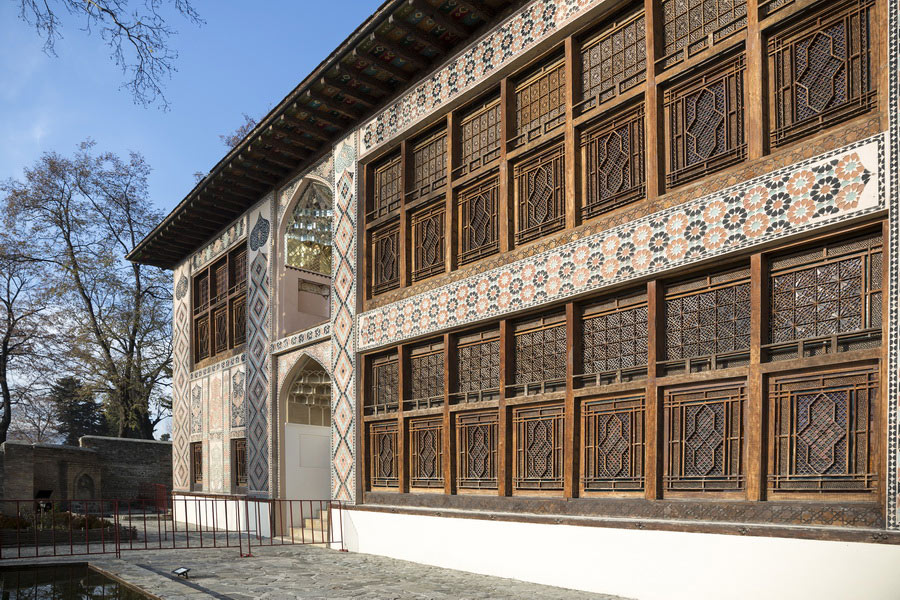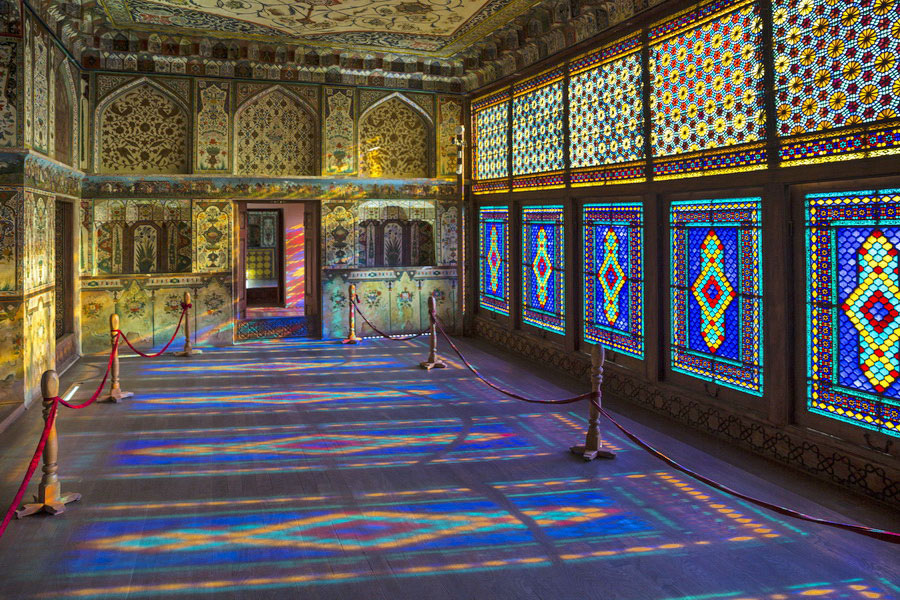Sheki, Azerbaijan

Sheki, Azerbaijan is one of the nation’s largest cities. It sits at the foot of the Greater Caucasus at 632 meters above sea level, just 30 kilometers from the nearby town of Oguz (Vartashen). Highways and airlines connect Ganja, Yevlakh and Baku to Sheki, and the major cities of Armenia and Georgia can be easily accessed from the city, as well.
Sheki is the former capital of the Sheki Khanate, which joined Russia in 1805. Upon annexation to Russia, the Sheki Selim Khan voluntarily accepted Russian citizenship. After the death of the last khan in 1819, Khan Ismail, the khanate was turned into one of the Transcaucasian provinces of tsarist Russia.
Sheki’s history, however, extends well before this time period: it is one of the oldest cities in Transcaucasia, to which its many historical and architectural monuments give testimony. The inhabitants of ancient Sheki employed an extensive irrigation system using pottery pipes that connected the city with natural water sources in the surrounding hills. All routes to Sheki were guarded for ages by a fortress called Telesen-Geresen (Come-See), which was likely built in the 15th century. It was a few kilometers north of Sheki, on the right bank of the Kishchay River. The ruins of this once impregnable defensive structure still remain today.
The Palace of the Sheki Khans, built in the 18th century under the directive of Kurban-Ali of Karabakh, is still majestic. Its openwork windows and walls, decorated with national drawings, aroused great interest among those who visited it, including Alexandre Dumas and the famed Russian general Nikolai Rayevsky. Not far from the palace is a two-story building of the same complex, built by Haji Ali-Zainal-Abdin and adorned with paintings based on characters in the works of Azerbaijan’s most acclaimed poet, Nizami Ganjavi.
Sheki was a major cultural center of Transcaucasia throughout much of history. The names of the poet Ismailbek Nakam and the prominent writer-educator Rashidbek Efendiyev are associated with the history of the city. Sheki is the birthplace of the remarkable playwright and philosopher Mirza Fatali Akhundov, a contemporary of Pushkin. The house where he spent his childhood and youth is now a museum.
The city’s past is also deeply entwined with Russian literature. Young Leo Tolstoy was sent here for military service, and his famous works "Prisoner of the Caucasus" and "Hadji Murad" convey the events that took place in the vicinity of Sheki with great artistic force. The accuracy of historical events he mentioned were confirmed through the discovery of the skull of Shamil's comrade-in-arms Hadji Murad, whose appearance was restored by the famous Soviet sculptor and anthropologist M. M. Gerasimov.

Ancient Sheki was likewise a major trading center. Isfahan, Tabriz and Lezgi caravanserais, oriental inns and hotels are still well preserved here, and lively local commerce continues to this day at Sheki Bazaar. In the city center, many old stone houses with tiled gable roofs, high verandas and courtyards fenced in by solid brick walls can still be seen.
Few monuments from Sheki’s past have survived to the present day. In order to save Sheki from destruction, a powerful belt of reinforced concrete dams was built on the northwestern outskirts of the city, and the surrounding slopes were reinforced with masonry. Today, hiking Sheki, Azerbaijan is one of the best options for discovering historical monuments in the vicinity and experiencing the region as it was in the days of old.
Sheki has long been famous for its silks, which were sought after in Azerbaijan and abroad. It has one of the largest silk factories, as well as silk-spinning and silk-weaving factories, and today Sheki’s colorful women's silk shawls are still in great demand around the world.
Traditional handicrafts, including jewelry, coinage, copper dishes and embroidery, are still available in Sheki. Visitors wondering where to eat in Sheki should look for a café serving piti, a regional specialty soup filled with chickpeas, quince and nuts. Local pastry shops are known for their tasty national sweets: Sheki baklava, made of rice flour and nuts; nabat, a rock candy made of boiled sugar; and bamiya, melt-in-your mouth straws of sweetened flour.
Countless orchards, which are able to thrive despite the dry Sheki weather, dot the city and its vicinity, including several mountain resort cottages. One of them, Khanyailagi (the former summer residence of the Khan), is located at an altitude of 2000 meters and has long been used by locals for summer recreation.
The enduring history and rich heritage of Sheki, Azerbaijan are worthy of recognition. Come see for yourself this former capital, trade center and cultural center of old!
Twin Cities of Sheki:
Giresun, Turkey
Osmangazi, Turkey
Gabrovo, Bulgaria
Slutsk, Belarus
